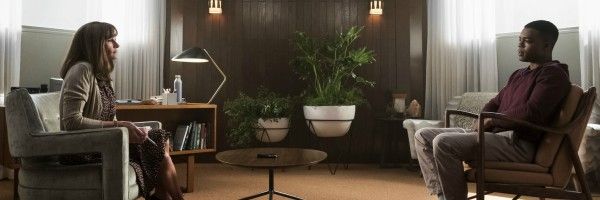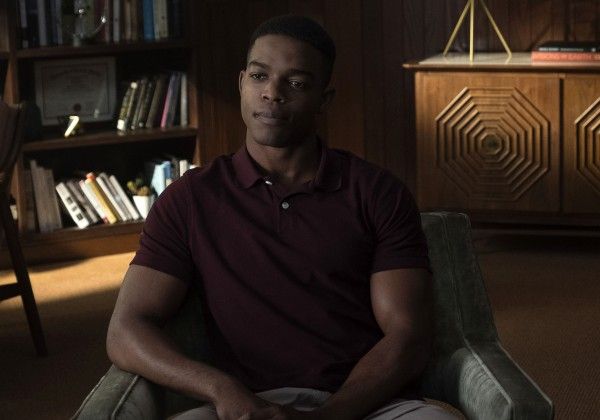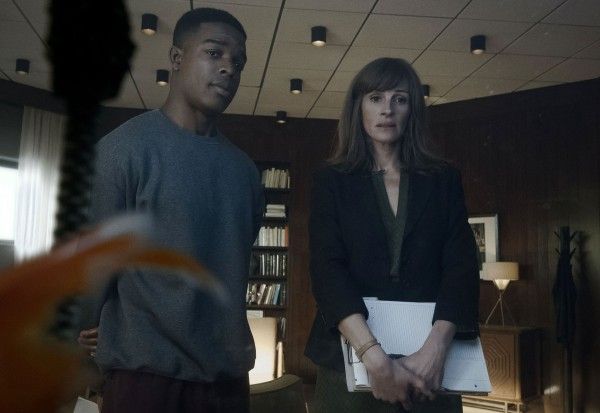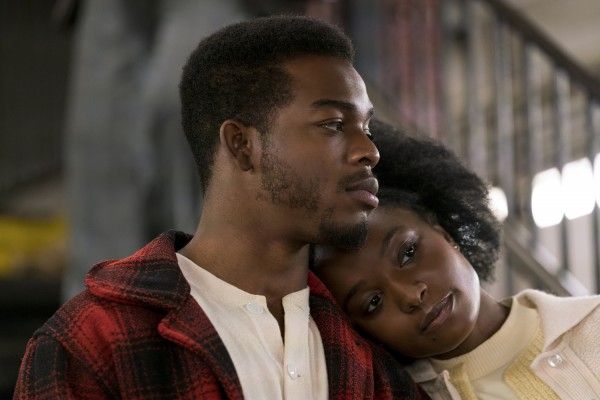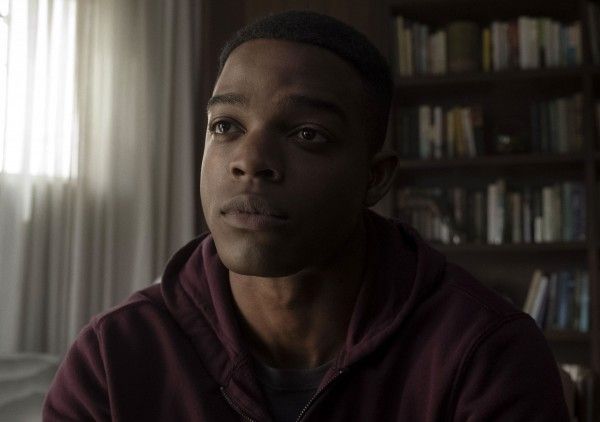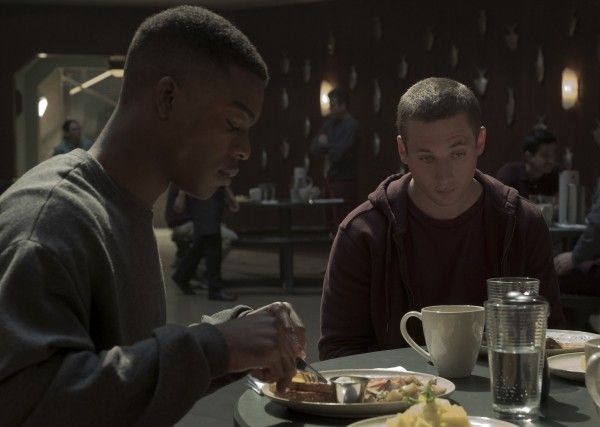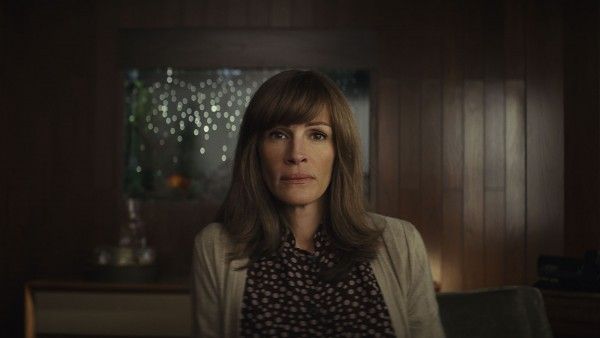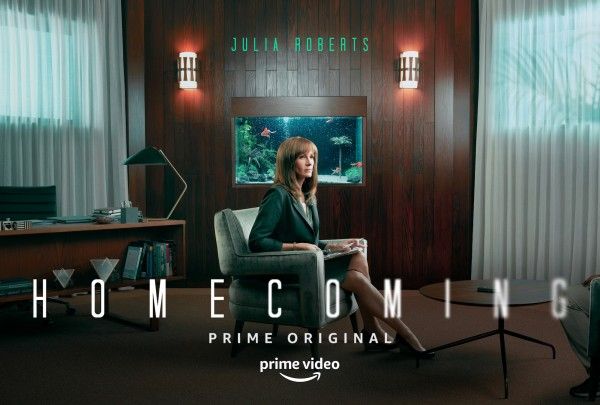From visionary director Sam Esmail (the creator of Mr. Robot) and Eli Horowitz & Micah Bloomberg, the creators of the critically acclaimed podcast of the same name, the psychological thriller Homecoming follows Heidi Bergman (Julia Roberts, in her first starring role in television), a caseworker at the Homecoming Transitional Support Center who helps soldiers deal with returning home from war. As she works with a young veteran named Walter Cruz (Stephan James) and they bond over his desire to rejoin civilian life, the two also develop a complex relationship while working through his experiences. Four years later, when a Department of Defense auditor (Shea Whigham) finds Heidi working as a waitress and living with her mother (Sissy Spacek) in a small town, his questions about her departure from her old job begin to unravel the reality that she has come to rely on.
At the Los Angeles press day for the TV series, Collider got the opportunity to chat 1-on-1 with actor Stephan James, and during the interview he talked about the acting journey he’s been on, especially over the last couple of years, the appeal of a project like Homecoming, working so closely with powerhouse actresses Julia Roberts and Marianne Jean-Baptiste, and his favorite moment of the series to shoot. He also talked about his determination to work with Barry Jenkins, his experience making If Beale Street Could Talk, the appeal of making the action film 17 Bridges with Chadwick Boseman, his desire to play Spider-Man, and wanting to direct, in the future.
Collider: I loved this! I watched all of the episodes in one sitting because I had to find out what was going to happen. What was your reaction when you found out about the full journey for your character and what the end of this story would be?
STEPHAN JAMES: I loved it. Firstly, I just loved the podcast, and then to be able to get these ten scripts and know the journey that Walter was gonna take, throughout this whole thing, was very, very fascinating. All actors wanna be able to change, over the course of a film or a show, and Walter gave me a great opportunity to do that.
And this half-hour drama format is so interesting and largely unexplored.
JAMES: To be able to make such dialogue heavy material interesting, and to be able to keep it within half an hour, was really cool.
I’ve been following your career since the Clue TV series.
JAMES: Jesus!
But I really started paying attention when you were on Shots Fired. It’s been a pretty amazing journey since then.
JAMES: Yeah, it has.
What was the point that you feel like the types of projects you were able to do started changing? Do you feel like there was something that really made people take notice?
JAMES: I don’t know that there was a particular point, but maybe a couple of years ago now. I’ve been very, very lucky and very fortunate to work with a lot of incredibly cool people. I’m spoiled by being able to take things from different directors and actors, that I can bring to the next thing. In the last couple of years, I’ve gotten a better idea of where I stand and had a better control over my destiny. I’ve always been selective, but now I can be even more selective, which is cool.
When you started on this path and you really started taking the whole acting thing seriously, what was your own personal goal? What did you envision for yourself, and does this look anything like that?
JAMES: I don’t know. I wanted to be in a couple of cool movies and channel my inner Denzel [Washington], or something. I don’t believe that I had a vision for how this would go. I was just very happy to be a part of anything, and was putting one foot in front of the other and piecing these projects together. My guideline was just to do things that I care about and that are important, and that’s led me to this place.
What was it about Homecoming that appealed to you, when it first came your way?
JAMES: The podcast was the first iteration of this story that I ever heard. I didn’t realize how cool it could be and how drawn in you could get, listening to people’s voices. For me, it was just fascinating, this whole world that I had experienced through voice, so the idea of bringing it to a television show was really, really exciting. Obviously, knowing that Sam Esmail was going to be directing it got me very excited. I’m a fan of Mr. Robot and how he is, stylistically, as a director, I thought would be really cool with this. And then, having the opportunity to work alongside Julia Roberts and be literally opposite her, every day, was very enticing. For me, this was a no-brainer.
And you’re not only working opposite Julia Roberts, but the fabulous Marianne Jean-Baptiste is playing your mother. What was it like to work with two such powerful women?
JAMES: Yeah, those two women are beasts, in the best sense I could possibility use that word. Julia Roberts is probably one of the most important actresses of our time, who aside from being an incredible actress, is just a phenomenal person. She’s just a great woman to be able to work with. Knowing that I was going to be spending so much time with her, and sharing so many moments, and that there would be these 10-page dialogue heavy scenes with her, I really couldn’t have asked for a better person to go into the trenches with and to partner with. I’m grateful that it was her. And I’ve been a fan of Marianne for so long. I think she’s incredible. And so, when I found out that she was playing my mom, I was just elated. I have so much love for her. She did exactly what I expected her to do, and more. I’m completely spoiled by being able to work with those two.
Did you have a favorite moment to shoot, for this?
JAMES: The funnest part, for me, was the Titanic Rising scene. I remember reading that, for the first time, and just being in tears from reading it, and that was the most fun scene to film. Me and Julia got to improvise that a little bit. One of the things that I really liked about the podcast is that it seemed like the characters were jumping on each other. That’s an exercise you do in improv, but to be able to do that for actual film or television is a really cool thing.
And I love how that moment comes back around and is also important, later on.
JAMES: This whole show is very, very thought out. I just feel like every frame is very intentional, and everything that Sam shoots is very intentional. There are a lot of things that loop in and out, throughout this season.
I also really love the relationship in this between your character and Jeremy Allen White’s character because it’s the one interaction with his past that we get to see him have, instead of just hearing about it through the therapy sessions. How was that dynamic to play, and did the harmonica ever get annoying?
JAMES: Definitely! I definitely told him to shut up, in real life. But no, Jeremy is fantastic. He brought this whole new dynamic to the show. When we first started filming, there was a week of just me and Julia. And then, all of a sudden, Jeremy came onto the set and the whole energy changed. The first scene I did with him was that scene in the cafeteria, where he has his mental breakdown. After he finished his coverage for that scene, everybody in the cafeteria applauded because of the energy and the light that he brought to that moment. I loved that dynamic, too, because it’s the only time we get to see him out of therapy. You get to see almost the polar opposite of Walter with Shrier, but knowing that they come from the same place, they share their perspective.
You also have If Beale Street Could Talk, which is out in theaters on November 30th. What was it like to take on a story like that, written by someone like James Baldwin, and for a filmmaker like Barry Jenkins?
JAMES: That was another one of those moments where I’ve just been completely spoiled by the filmmakers that I’m getting to work with. I’ve been a fan of Barry Jenkins since I watched Moonlight, and then went back and watched Medicine for Melancholy, his first film. I just knew that I was gonna work with him, I just didn’t know when. And then, to get a call from my manager saying that he was going to make his next film, which was gonna be based on a James Baldwin novel, it was eerie because I was already speaking it into existence. I was saying that I wanted to work with him and that I knew it was gonna happen. And then, there was this character, Fonny, who I felt so attached to, right off the bat. I put a couple of scenes on tape, and then Barry called me and we had a lunch in L.A. He gave me his vision for the film an told me what he was hoping to accomplish with it, and I told him that I felt that I was the right guy for the part and that I’d do whatever he wanted me to do, whether he wanted me to put all of the scenes in the film on tape. I’d do whatever I had to, to a part of it, to work with him, and to tell this story. I felt that strongly about it and about the character. I was incredibly lucky to be able to work with Barry.
When you get that attached to something before you officially get the role, do you ever feel like you’re creating a pressure for yourself that you can’t possible live up to?
JAMES: Of course! It’s scary place to get to, when you love something so much. As an actor, you’ve got to learn to not get too attached to things that aren’t yours, when it’s just up in the air. But sometimes, you get a strange feeling that something is yours and meant to be yours, and that’s a feeling that I couldn’t fight on this project. I knew that I wanted to do it, and I spoke it into fruition.
You’re also signed on to do an action thriller with Chadwick Boseman and Taylor Kitsch, called 17 Bridges.
JAMES: I am.
Is it a childhood dream to be in an action movie like that?
JAMES: 100%. I’m checking off a bucket list thing, right now, to do an action film. It’s something that I’ve really been looking forward to doing. I don’t think anyone has seen me in a role like this, certainly not in a film like this. And to be doing it with this great group of actors, like Taylor Kitsch, J.K. Simmons and Chadwick Boseman, it’s gonna be special. I’m very excited about that. I’m filming it right now.
What was it about this action film, in particular, that really spoke to you?
JAMES: Honestly, it was the characters. A lot of times, when you have action pieces, they’re more focused on the action rather than on the characters, but this is a piece that does the sensational job of being a character piece, as well, and it humanizes characters that we don’t really see humanized in film. It’s very, very exciting, in that sense. It’s daring, it’s risky and it’s something that’s gonna put audiences in the conflict of, “Who do we like? Who’s the good guy? Who’s the bad guy?” There are a bunch of those different character dynamics, while also having everything that you want in your action films, like stuff blowing up, people being shot, jumping out of buildings, and driving cars really fast. Those are all things that I’ve wanted to do, my whole career.
What else is on your movie bucket list?
JAMES: I wanna play Spider-Man. Hopefully, I’ll do that pretty soon. And I’d like to try directing and producing. There are a lot of ideas that I have, and I’m getting to a point in my career now where I can start to cultivate and curate things. People are trusting me, and I’ve built certain relationships that can help me get things developed, so it’s about expanding my horizons, in that regard.
When you read projects, what is it, at this point, that gets you to say yes to something and what makes you look at something and go, “You know, this just isn’t for me”?
JAMES: I try not to think about what’s not for me, and more about what is for me. I’ve always been pretty selective about the work I do. I pretty much know, within the first few pages, whether something is for me. You get a sense for a story. I don’t have to wait until it’s over to know whether I want to be a part of something. And then, who’s going to be alongside me, producing, directing and starring, are all things that I take into account, when I’m deciding what to do.
You talked about wanting to direct. As a result, do you find yourself watching the directors that you work with more and more?
JAMES: 100%. I wish I had more time to not be acting while watching these directors, and to actually just be able to watch and mirror them. That’s one of my goals, for the next year. I want to just be able to sit on the set, not working as an actor, and shadow other incredible directors. I’ve had an opportunity to work with a few, and to be able to just be a fly on the wall and watch those monitors and see what they see, I think could be really cool. I hope to do more of that.
Homecoming is available to stream at Amazon Prime.

